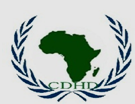After forty years of dictatorship, the Democratic Republic of Congo (DRC) is attempting a transition to democracy. An important part of this process has been the establishment of a transitional justice. Transitional justice is a process established to deal with human rights violations committed under the authoritarian regime. This is considered crucial to the success of democratic transition.
The purpose of transitional justice in the Democratic Republic of Congo (DRC) is to reconcile people and build a new nation based on democratic principles. The relation between political forces in the DRC is an important element to determine the success of transitional justice.
This research aims to develop understanding of the challenges of the transitional justice in the DRC such as the lack of disarmament, current political crisis, obstacles to the Truth and Reconciliation Commission (TRC) and Justice roles; and issue of nationality.
During four decades, the DRC has been ruled by authoritarian regimes, which did not promote human rights. For a long time, the DRC has been paralyzed by inhuman practices of successive undemocratic regimes. The democratization which emerged in 1990 was several times interrupted by political crisis. In order to avoid the cycle of political instabilities the democratisation process should be guaranteed and consolidated only through a transitional justice which deals with past violence.
There are certain issues which should be solved during the Congolese transitional justice. The first is relating to the application of amnesty and justice. The second involves the resolution of a number of political issues which should be taken into account for a perfect national integration and democratisation. The third is relating to the relations of political power in the DRC.

